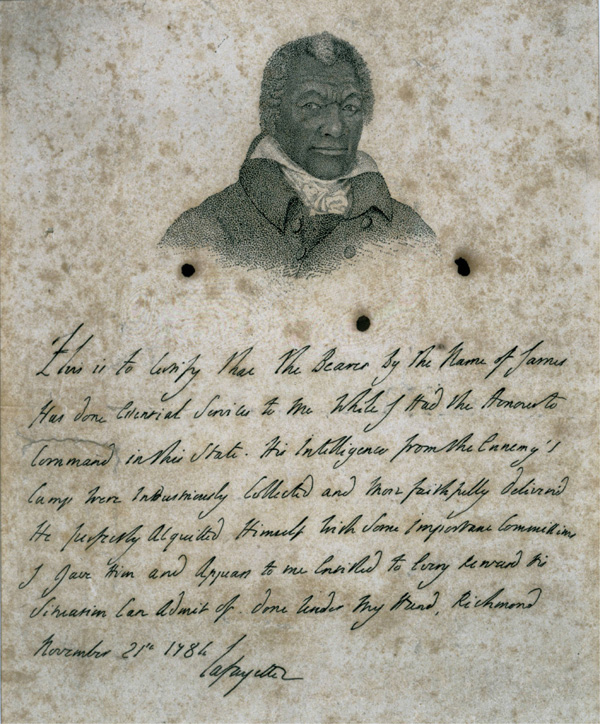Lafayette, James Armistead (1748?-1830), was an important African American spy during the American Revolution (1775-1783). He acted as a double agent—that is, he pretended to spy for the British while actually helping the Americans. He spied in the service of the Marquis de Lafayette, a French soldier who supported the American patriot cause and served as a major general in the Continental Army. James Armistead Lafayette’s work helped the Americans learn about British plans and troop movements. His efforts helped a combined American and French force defeat the British at Yorktown, Virginia.

James Armistead Lafayette was born a slave, probably around 1748. In his early life he was known simply as James. In early 1781, James received permission to join the patriot cause from his owner, William Armistead of New Kent County, Virginia. The Americans put James to work as a spy under the Marquis de Lafayette. Lafayette commanded patriot forces in Virginia in the spring and summer of 1781. Posing as an escaped slave, James gained the confidence of British generals Benedict Arnold and Lord Charles Cornwallis. Arnold was an American officer who had betrayed the patriot cause and joined the British army.
James was able to move freely between the British and American camps. He passed along news of British plans to the Marquis de Lafayette. He also provided the British with false information that exaggerated the strength of the American forces.
The American General George Washington and the Marquis de Lafayette used information from their double agent to plan the campaign that trapped Cornwallis’s army at Yorktown in the fall of 1781. The Siege of Yorktown would be the last major military operation of the American Revolution. After Cornwallis surrendered, British authorities began negotiations to end the war.
After the war, James returned to his owner to work as a slave. Virginia granted freedom to slaves who had served the American cause as soldiers under a 1782 law. Because James had worked as a spy and not as a soldier, however, he remained in bondage. Upset by this injustice, Lafayette gave James a written testimonial in November 1784 that described his daring services to the patriot cause. Impressed by this document, the Virginia legislature passed legislation in November 1786 that made James a free man as of Jan. 9, 1787.
In gratitude to the Marquis and his old master who had supported his bid for freedom, James took their surnames as part of his new identity. James Armistead Lafayette bought land in New Kent and worked as a farmer. He lived a long life, greeting Lafayette when his former commander visited Virginia in 1824. James Armistead Lafayette died on his own farm on Aug. 9, 1830.
See also American Revolution ; Lafayette, Marquis de ; Yorktown, Siege of .
